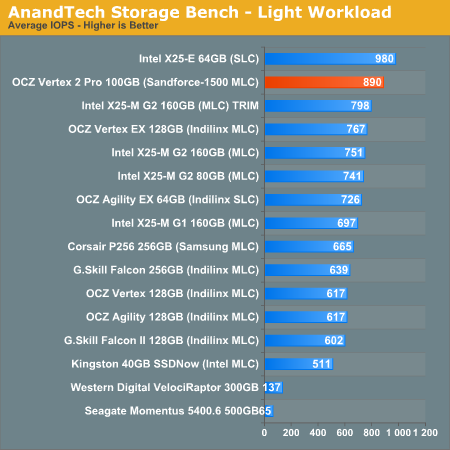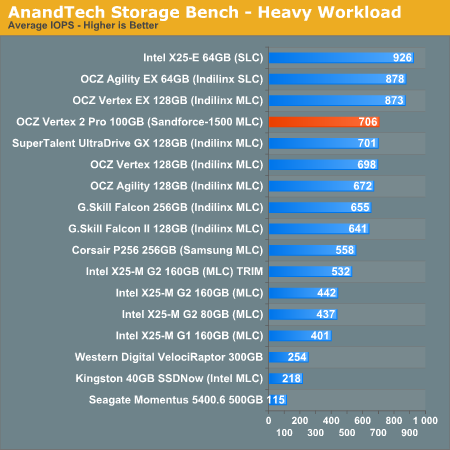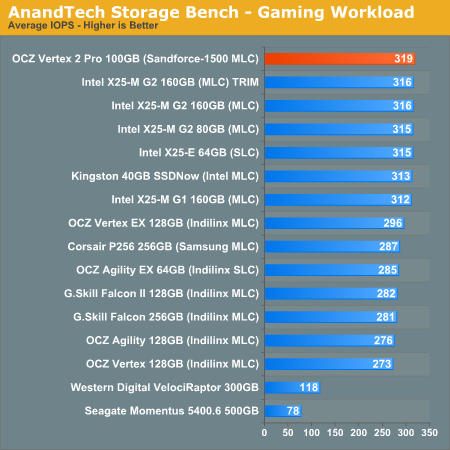OCZ's Vertex 2 Pro Preview: The Fastest MLC SSD We've Ever Tested
by Anand Lal Shimpi on December 31, 2009 12:00 AM EST- Posted in
- Storage
AnandTech Storage Bench
I introduced our storage suite in our last SSD article and it’s back, now with more data :)
Of the MLC SSDs represented here, there’s just nothing faster than the SandForce based OCZ Vertex 2 Pro.
Intel’s SLC based X25-E actually does very well, especially for a controller that’s as old as it is. It is worth noting however that the only thing separating Intel from SandForce-level performance is the X25-M’s low sequential write speed...
The first in our benchmark suite is a light usage case. The Windows 7 system is loaded with Firefox, Office 2007 and Adobe Reader among other applications. With Firefox we browse web pages like Facebook, AnandTech, Digg and other sites. Outlook is also running and we use it to check emails, create and send a message with a PDF attachment. Adobe Reader is used to view some PDFs. Excel 2007 is used to create a spreadsheet, graphs and save the document. The same goes for Word 2007. We open and step through a presentation in PowerPoint 2007 received as an email attachment before saving it to the desktop. Finally we watch a bit of a Firefly episode in Windows Media Player 11.
There’s some level of multitasking going on here but it’s not unreasonable by any means. Generally the application tasks proceed linearly, with the exception of things like web browsing which may happen in between one of the other tasks.
The recording is played back on all of our drives here today. Remember that we’re isolating disk performance, all we’re doing is playing back every single disk access that happened in that ~5 minute period of usage. The light workload is composed of 37,501 reads and 20,268 writes. Over 30% of the IOs are 4KB, 11% are 16KB, 22% are 32KB and approximately 13% are 64KB in size. Less than 30% of the operations are absolutely sequential in nature. Average queue depth is 6.09 IOs.
The performance results are reported in average I/O Operations per Second (IOPS):

If there’s a light usage case there’s bound to be a heavy one. In this test we have Microsoft Security Essentials running in the background with real time virus scanning enabled. We also perform a quick scan in the middle of the test. Firefox, Outlook, Excel, Word and Powerpoint are all used the same as they were in the light test. We add Photoshop CS4 to the mix, opening a bunch of 12MP images, editing them, then saving them as highly compressed JPGs for web publishing. Windows 7’s picture viewer is used to view a bunch of pictures on the hard drive. We use 7-zip to create and extract .7z archives. Downloading is also prominently featured in our heavy test; we download large files from the Internet during portions of the benchmark, as well as use uTorrent to grab a couple of torrents. Some of the applications in use are installed during the benchmark, Windows updates are also installed. Towards the end of the test we launch World of Warcraft, play for a few minutes, then delete the folder. This test also takes into account all of the disk accesses that happen while the OS is booting.
The benchmark is 22 minutes long and it consists of 128,895 read operations and 72,411 write operations. Roughly 44% of all IOs were sequential. Approximately 30% of all accesses were 4KB in size, 12% were 16KB in size, 14% were 32KB and 20% were 64KB. Average queue depth was 3.59.

Our final test focuses on actual gameplay in four 3D games: World of Warcraft, Batman: Arkham Asylum, FarCry 2 and Risen, in that order. The games are launched and played, altogether for a total of just under 30 minutes. The benchmark measures game load time, level load time, disk accesses from save games and normal data streaming during gameplay.
The gaming workload is made up of 75,206 read operations and only 4,592 write operations. Only 20% of the accesses are 4KB in size, nearly 40% are 64KB and 20% are 32KB. A whopping 69% of the IOs are sequential, meaning this is predominantly a sequential read benchmark. The average queue depth is 7.76 IOs.











100 Comments
View All Comments
blowfish - Friday, January 1, 2010 - link
80GB? You really need that much? I'm not sure how much space current games take up, but you'd hope that if they shared the same engine, you could have several games installed in significantly less space than the sum of their separate installs. On my XP machines, my OS plus programs partitions are all less than 10GB, so I reckon 40GB is the sweet spot for me and it would be nice to see fast drives of that capacity at a reasonable price. At least some laptop makers recognise the need for two drive slots. Using a single large SSD for everything, including data, seems like extravagant overkill.Gasaraki88 - Monday, January 4, 2010 - link
Just as a FYI, Conan take 30GB. That's one game. Most new games are around 6GB. WoW takes like 13GB. 80GB runs out real fast.DOOMHAMMADOOM - Friday, January 1, 2010 - link
I wouldn't go below 160 GB for a SSD. The games in just my Steam folder alone go to 170 GB total. Games are big these days. The thought of putting Windows and a few programs and games onto an 80GB hard drive is not something I would want to do.Swivelguy2 - Thursday, December 31, 2009 - link
This is very interesting. Putting more processing power closer to the data is what has improved the performance of these SSDs over current offerings. That makes me wonder: what if we used the bigger, faster CPU on the other side of the SATA cable to similarly compress data before storing it on an X25-M? Could that possible increase the effective capacity of the drive while addressing the X25-M's major shortcoming in sequential write speed? Also, compressing/decompressing on the CPU instead of in the drive sends less through SATA, relieving the effects of the 3 GB/s ceiling.Also, could doing processing on the data (on either end of SATA) add more latency to retrieving a single file? From the random r/w performance, apparently not, but would a simple HDTune show an increase in access time, or might it be apparent in the "seat of the pants" experience?
Happy new year, everyone!
jacobdrj - Friday, January 1, 2010 - link
The race to the true 'Isolinear Chip' from Star Trek is afoot...Fox5 - Thursday, December 31, 2009 - link
This really does look like something that should have been solved with smarter file systems, and not smarter controllers imo. (though some would disagree)Reiser4 does support gzip compression of the file system though, and it's a big win for performance. I don't know if NTFS's compression is too, but I know in the past it had a negative impact, but I don't see why it wouldn't perform better if there was more cpu performance.
blagishnessosity - Thursday, December 31, 2009 - link
I've wondered this myself. It would be an interesting experiment. There are http://en.wikipedia.org/wiki/Comparison...systems#... (NTFS, Btrfs, ZFS and Reiser4). In windows, I suppose this could be tested by just right clicking all your files and checking "compress" and then running your benchmarks as usual. In linux, this would be interesting to test with btrfs's SSD mode paired with a low-overhead io scheduler like noop or deadline.What interests me the most though is SSD performance on a http://en.wikipedia.org/wiki/Log-structured_file_s... as they theoretically should never have random reads or writes. In the linux realm, there are several log-based filesystems (JFFS2, UBIFS, LogFS, NILFS2) though none seem to perform ideally in real world usage. Hopefully that'll change in the future :-)
blagishnessosity - Thursday, December 31, 2009 - link
correction:There are http://en.wikipedia.org/wiki/Comparison...systems#...">several filesystems that support transparent compression (NTFS, Btrfs, ZFS and Reiser4).
What interests me the most though is SSD performance on a http://en.wikipedia.org/wiki/Log-structured_file_s...">Log-based filesystem as they theoretically should never have random reads or writes.
(note to web admin: the comment wysiwig does not appear to work for me)
themelon - Thursday, December 31, 2009 - link
Note that ZFS now also has native DeDupe support as of build 128http://blogs.sun.com/bonwick/en_US/entry/zfs_dedup">http://blogs.sun.com/bonwick/en_US/entry/zfs_dedup
grover3606 - Saturday, November 13, 2010 - link
Is the used performance with trim enabled?